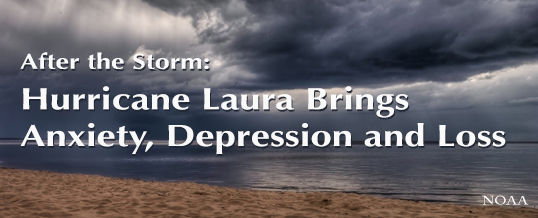
For several days, the news had been hammered into residents of Southwest Louisiana and parts of Texas: a dangerous hurricane of potentially monstrous proportions is headed your way. The surge alone will be unsurvivable. Leave almost all that you own, all that you call home, and get out of the way now before it’s too late.
The anxiety brought about by the ceaseless warnings were the stuff of sleepless nights. “I began to feel anxious during my evacuation from Laura when I heard weather announcers use the term ‘unsurvivable’ because of a possible 20-foot storm surge,” says Lake Charles resident Kathy English. (Names have been changed in the interest of privacy.) “My anxiety was so high the night that Laura hit that I don’t think I slept at all. I kept imagining people who stayed drowning just like they had during Audrey.” Four hundred seventeen souls lost their battle with the savage surge and winds of Audrey.
“I am a veteran of hurricanes, having experienced my first one, Audrey, at age seven. Fifteen years ago, I went through Rita and then a few years later Ike,” says Kathy.
People also worried about friends and family. Who was evacuating, who was staying? Joan Rogers was upset. “I was experiencing anxiety due to the fact my son and his family didn’t evacuate. The level was 7 on a scale of 1-10.”
As a high Category 4 storm with wind speeds up to 150 mph, Laura crashed into the Gulf Coast near Cameron, LA in the earliest hour of Thursday, August 29. Laura tied with an 1856 hurricane as the strongest storm to hit the Gulf Coast.
The physical damage was catastrophic, with buildings destroyed, trees and electricity poles torn down like toys smashed by an angry child. The landscape of Southwest Louisiana and areas north were nearly unrecognizable. People were also scattered in parts north, east, and sometimes west to save their lives and get out of the way of the storm. More than 22,000 were without power, some for weeks. In the end, Laura took 27 Louisiana lives.
Then the waiting began. While veterans of storms knew that media sometimes exaggerated the results of disasters, that somehow was not comforting as the news came trickling out of Louisiana. Kathy, a small business owner, explained that “Two days after Laura hit, a person I know had returned and taken pictures of my office building. The back side of the roof looked like it had been peeled to the plywood. I was very worried about my house and felt frustrated that I couldn’t get any word on it. Then the pictures of the aftermath started flooding social media. I remember thinking it looked like a war zone.”
Other, larger businesses took a hit as well. A Lake Charles landmark suffered. “The first time I saw pictures of the Capital One Tower with all the windows blown out I cried. I later felt the same way when I saw the before and after pictures of Our Lady Queen of Heaven Church. It looked bald and naked without the trees,” says Kathy.
According to Forecast: Increasing Mental Health Consequences From Atlantic Hurricanes Throughout the 21st Century, “Exposure to hurricane hazards and experiencing resultant losses and life changes can lead to new-onset mental disorders among previously healthy survivors and jeopardize the health of persons with preexisting mental illness.” As storms become increasingly more powerful due to climate changes, those whose lives are affected by these disasters may undergo anxiety, loss and depression and other distressing mental struggles, including substance and alcohol abuse.
Financial hardships, homelessness, worry over loved ones and friends and sometimes loss of loved ones and friends can bring about these struggles. Physical cleanup of yards and homes, dealing with insurance and contractors, and dealing with the slow pace of repairs due to everyone needing everything all at once can lead to depression.
Kathy relates that “Several stressors have happened so far in the recovery process. Not being able to get my office tarped more quickly resulted in severe interior water damage and I have been trying to operate remotely without any internet other than my personal hotspot. The local cable and internet company is going extremely slowly in restoring Internet service and debris is piled up all along my street. I get depressed just looking at the piles of ruined things that represent ruination of lifestyle.”
The authors of the Forecast article also write that “For storm-affected populations, the psychological footprint greatly exceeds the medical footprint. Simply stated, more people are affected psychologically than medically after any given hurricane.”
The article “The Storm After The Storm: Disaster's Mental Toll” by Kathleen Doheny, points out the first signs of stress. Yuval Neria, Ph.D., professor of medical psychology and director of the PTSD treatment and research program at Columbia University Medical Center says that "Usually what we see first is the anxiety, fear, the difficulty in concentrating and functioning.” If not treated, these can lead to substance abuse or Post Traumatic Stress Syndrome.
Sometimes, symptoms don’t appear until weeks or even months later.
“As the days went on and I saw more of the devastation I got more emotional. Only for moments. Being displaced from work and having to drive 45 minutes one way to work without access to my flies was most stressful for me,” says Joan.
One of the stressors that are perhaps unique to the disaster of Laura is that residents feel they have been overlooked by the media. They understand that with the pandemic, fires and current divisiveness of the nation, what happened to Louisiana quickly took a back seat. Kathy says, “Laura and its devastation of SWLA have largely been ignored by the rest of the country. Because of that, we feel like the invisible middle child in a large family. But resilience will win. I believe we are determined for it to triumph.”
Being overlooked by the media has perhaps cost the region in terms of help receiving aid, prompt actions in several services and other areas that the goodwill and eagle eye of the nation usually brings during times of disaster.
In coping with her Laura-inspired feelings, Kathy practices mindfulness and walking her dogs. “I’ve been walking my dogs every day and doing mindfulness meditation as much as I can. I also give myself permission to cry when I need to.”
The American Psychological Association advises several steps to cope with traumatic stress:
- Recognize that this is a challenging time but one that you can work to manage. You’ve tackled hardships at other times in your life. Tap into the skills you used to get through past challenges.
- Allow yourself to mourn the losses you have experienced. Recognize that you may experience a variety of emotions and their intensity will likely lessen over time.
- Take a news break. Watching replays of footage from the hurricane can make your stress even greater. Often, the media tries to interest viewers by presenting worst case scenarios. These may not be representative of your home or community.
- Ask for support from people who care about you and who will listen and empathize with your situation. But keep in mind that your typical support system may be weakened if those who are close to you also have experienced or witnessed the hurricane.
- Find ways to express yourself when ready. Communicating your experience through talking with family or close friends, keeping a diary, or other forms of self-expression may be a source of comfort. Find out about local support groups led by appropriately trained and experienced professionals. Support groups are often available in communities following large-scale disasters. People can experience relief and comfort connecting with other hurricane survivors who have had similar reactions and emotions. These can be especially helpful for people with limited personal support systems.
- Engage in healthy behaviors to enhance your ability to cope with excessive stress. Eat well-balanced meals and get plenty of rest. If you experience difficulties sleeping, you may be able to find some relief through relaxation techniques. Avoid alcohol and drugs since these can increase a sense of depression and/or impede you from doing what is necessary to be resilient and cope with events.
- Establish or reestablish routines such as eating meals at regular times and following an exercise program. Take some time off from the demands of daily life by pursuing hobbies or other enjoyable activities.
- If possible, avoid major life decisions such as switching jobs, because these activities tend to be highly stressful.
Both Kathy and Joan have seen silver linings. Joan explains: “I have seen greater resolve, a coming together and genuine caring in our community and communities close to us. Neighbors looking out for and helping others. With the fences blown down, most neighbors are really connecting.
Kathy adds, “I have talked to many neighbors and friends and we all share this feeling of family and community coming together. We are helping each other as much as we can. I just hope we can keep it going.”
If you feel you would benefit from talking with a professional, counselors are standing by at New Horizons. Simply call (337) 478-1411 to set up a visit.
OCT '20
<
